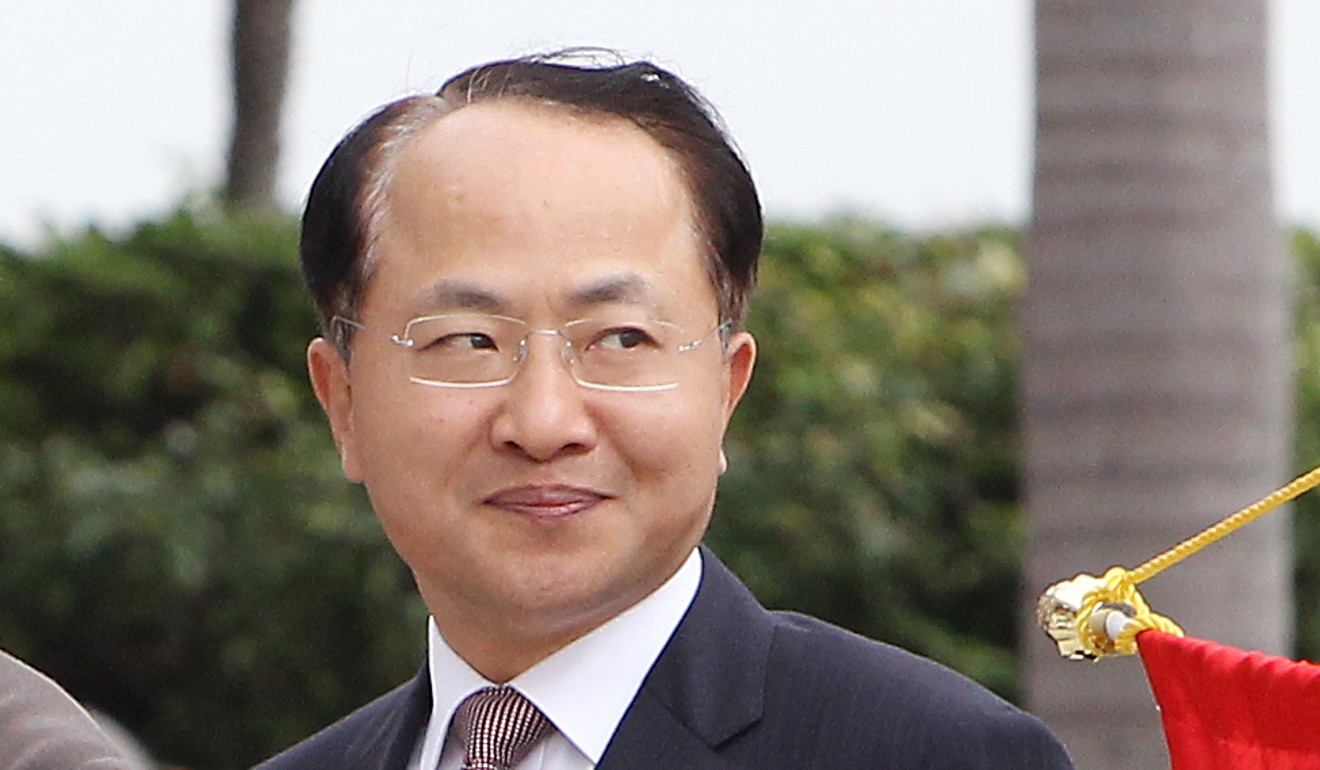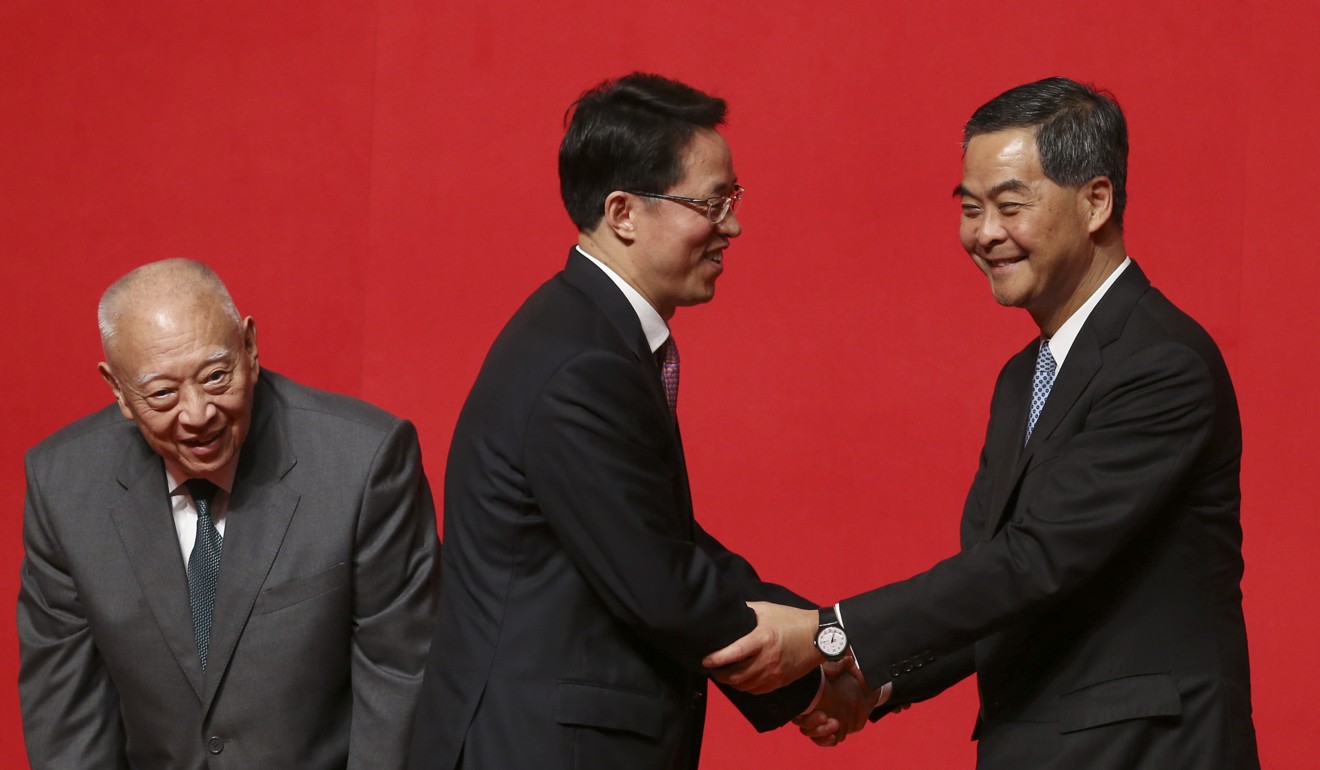
Liaison office chief Zhang Xiaoming to leave Hong Kong for Beijing post, source says
Zhang will oversee city’s affairs from capital while Wang Zhimin to become new director of the central government’s liaison office in Hong Kong
Beijing’s chief representative in Hong Kong, a veteran known for his firm stance against the central government’s critics, will return to the capital and take over as a top official overseeing Hong Kong and Macau affairs, the Post has learned.
Zhang Xiaoming, 54, will replace career diplomat Wang Guangya, 67, as director of the State Council’s Hong Kong and Macau Affairs Office.

A source also revealed that Zhang’s post of director of the central government’s liaison office in the city will be taken over by Wang Zhimin, currently the head of Beijing’s liaison office in Macau.
Zhang has been director of the liaison office in Hong Kong since December 2012 and has sought to manage the central government’s relations with various sectors in the city.
Zhang Xiaoming’s controversial speech on Hong Kong governance: The full text
The congress, which starts on October 18, will chart the direction of the party and is expected to unveil a major reshuffle of the top leadership. But the list of 2,300 delegates has yet to be fully released.

Before taking up his role in the city’s liaison office, Zhang began serving in Beijing’s Hong Kong and Macau Affairs Office in 1989 and rose through the ranks to become its deputy director in 2004.
During his tenure as liaison office director, Zhang was praised by pro-establishment politicians for his firm stance against Beijing’s critics and pro-independence activists.
Recent Hong Kong court rulings show ‘rainbow after storm’, Zhang Xiaoming says
The role of the liaison office in Hong Kong has often been a target of concern, if not criticism. Well before Zhang assumed his role, the liaison office had been facing bipartisan calls to steer clear of local affairs and not meddle beyond its purview, with pan-democrats repeating the criticism that “Western District”, the location of the office, was “ruling Hong Kong”.
In response, Zhang said in January 2013 that “‘Western District’ doesn’t rule Hong Kong, but ‘Western District’ must do its job and fulfil the tasks the central government has given us.”
Zhang’s predecessor, Wang, indicated as early as March last year that he was “prepared to step down at any time” as he was past the retirement age of 65 for officials of that rank.
Wang Zhimin, 60, was also no stranger to the Hong Kong liaison office. He served as a deputy director of the liaison office in Hong Kong from 2009 to 2015, and oversaw the office’s liaison work with the city’s youth organisations.
Before heading the liaison office in Macau from July last year, he served as a deputy director of the Hong Kong and Macau Affairs Office for about a year.
Many of Hong Kong’s problems are in fact problems with the allocation of resources
Edward Lau Kwok-fan, a 36-year-old lawmaker from the Beijing-loyalist Democratic Alliance for the Betterment and Progress of Hong Kong, said he hoped Zhang could draw upon his experience to improve Hong Kong’s relationship with the mainland.
“Both Zhang and Wang are familiar with Hong Kong’s issues and changes in recent years,” he said.
“Many of Hong Kong’s problems are in fact problems with the allocation of resources. I hope that Zhang, in his new role, can communicate with the Hong Kong government so that the central and local administrations can come up with policies to solve those problems together.”
Lau also hoped Wang could ramp up the liaison office’s communication with Hong Kong’s young people.
“There are a lot of ideas and different voices among our young people. They should be valued ... and listened to, so that their problems and concerns can be sorted out.”
Meanwhile Lau Siu-kai, vice-chairman of the Chinese Association of Hong Kong and Macau Studies, a semi-official mainland think tank, said the expected appointment of Wang Zhimin highlighted Beijing’s concern over the views of youth in Hong Kong.
Veteran China watcher Johnny Lau Yui-siu said while he would advise officials to communicate with young people in the city, especially with young members of moderate political groups, he does not think the reshuffle would help to inject new thought into Beijing’s policies on Hong Kong.
“Before Wang Guangya assumed office, people also said that with his experience as a diplomat, his international perspective would help him to be more flexible. That did not happen, because Xi wanted to maintain Beijing’s tight grip on Hong Kong,” he said.
Democratic Party vice-chairman Lo Kin-hei said he had no expectation for Zhang Xiaoming and Wang Zhimin, given the former’s hardline stance on pro-democracy and pro-independence activists.
“I think Zhang has been fuelling conflicts in Hong Kong with his criticism. How can we expect him to play a part in improving Hong Kong’s ties with Beijing?” Lo said.
“If Wang Zhimin is going to address the concerns of Hong Kong’s youth with the same mindset that other central government officials have been using, I can tell him that he will not succeed,” he said, adding that Beijing needed to recognise that Hongkongers were upset about its meddling with affairs in their city.

